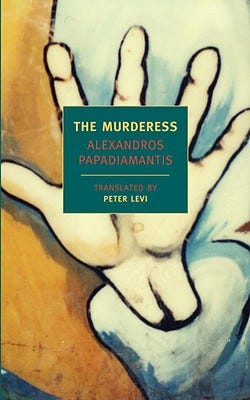The Best Greek Novel I've Ever Read!
(yeah, yeah, the only Greek novel etc.)
I’m reading my way around the world in translation, but of course I’m skipping a lot. I’m doing 84 books, and there are 195 countries, if you don’t count those weird mountain towns in California where the postmaster is also the king. Some of those skips are painful, others easy: Since the point is to discover new literatures, I can pass over countries I’ve already read a lot from. So I’m not hitting up France, Italy, Germany, Nigeria, South Africa, Russia, Israel, India, England, Ireland…
A couple of exceptions: I’m planning to stop in New Zealand and Canada, but to do indigenous literature in English translation, an area in which I’m woefully under-read.
And then there’s Greece. I went to good schools where they made me read a lot of Greek literature, but I’m pretty sure the most modern thing I read was from around 300 BCE.
Enter:
The Murderess (1903) by Alexandros Papadiamantis (1851-1911), translated in the early ‘80s for New York Review Books by Oxford don Peter Levi.
It is short, folkloric, horrifying, and weird. If you’ve read it, please talk to me in the comments! If you haven’t, I need you to read it right away so we can talk.
I Have THOUGHTS…
But first, check out this alternate cover. What the absolute hell.
The basic story: On the island of Skiathos (Papadiamantis’s home turf), an old woman named Hadoula, who comes from a line of witches/herbal healers, kills her newborn granddaughter one night in what she considers an act of mercy. (The child is sick—and in a culture in which every daughter means an enormous dowry, Hadoula believes she’s a burden.) She then goes on to kill four more girls around the island. After she’s suspected in the fourth of the five deaths, she goes on the run—hiding in the woods, jumping out windows, scrabbling over rocks.
The only real connection I saw to the Greek epics and tragedies of my high school days is that everyone seems to have three names. Hadoula, who is also Hadoula Frankissa and also Frankojannou, has a dead husband who is called Iannis and The Hat and The Bill. I was tempted to keep a chart inside the cover, a la my 1992 copy of The Odyssey (Athena = Pallas = The Virgin!) but soon enough Hadoula is alone in the woods, and nothing is too confusing.
I’m only on book six of my trek, but this one continues the delightful pattern of wild female characters that aren’t bending over backward to be likable. My Hungarian (The Door) and Austrian (The Piano Teacher) reads gave us wonderfully flawed and even witchy characters, but this is our first actual murderer.
Part of me is galvanized: It’s okay to write deeply problematic women! An author can make us sympathize with anything if they explain it thoroughly enough!
Part of me is furiously jealous: A disproportionately high percentage of American readers will always look at all female characters through a lens of judgment. (Sure, she saved the world, but should she really have put her child in daycare?)
Mostly, I’m awed. I love fiction that taps so naturally into a sense of the folkloric that it feels like a story that’s always existed. And Hadoula feels as old and inevitable as Baba Yaga, as Loki, as any fairytale witch.
And yet this is also a sharp political commentary, in that Hadoula’s actions respond, if ludicrously, to the circumstances of gender and money that exist on the island. It’s a bit “A Modest Proposal,” and a bit Breaking Bad.

We get passages like this:
“Everyone had to give in addition a dowry counted in money. It might be two thousand, or a thousand, or five hundred. Otherwise, he could keep his daughters and enjoy them. He could put them on the shelf. He could shut them up in the cupboard. He could send them to the Museum.”
And like this:
“Taxation took over from looting, and ever since then the whole beloved people has continued to labor for a vast central stomach which has no ears.”
On a different note, I’ll add (cryptically) that the ending is absolutely perfect. Just an A++ closing line, one that would feel heavy-handed on a more realist novel, but appropriately summary and moralistic (but nuanced!) for what’s essentially a fucked up bedtime story.
Where Are We Going Next?
Turkey!!!
Madonna in a Fur Coat, by Sabahattin Ali. This one’s available on audio, too…
“A shy young man leaves his home in rural Turkey to learn a trade and discover life in 1920s Berlin. There, amidst the city’s bustling streets, elegant museums, passionate politics, and infamous cabarets, a chance meeting with a beautiful half-Jewish artist transforms him forever.”
I hope you’ll join me!
(And here’s what’s after that…)
Hello From the Sky
Appropriately, I’m writing this on a Boeing 737. I’m right over your house. Oh my God, put some clothes on.










"Matt, I didn't expect to hear from you. I thought we decided you were done with therapy."
"Yeah, I know, I was, but then I started reading this Substack and there was this book cover with a crow (or maybe a raven) eating a baby doll ..."
Oh my god put some clothes on. Lol.